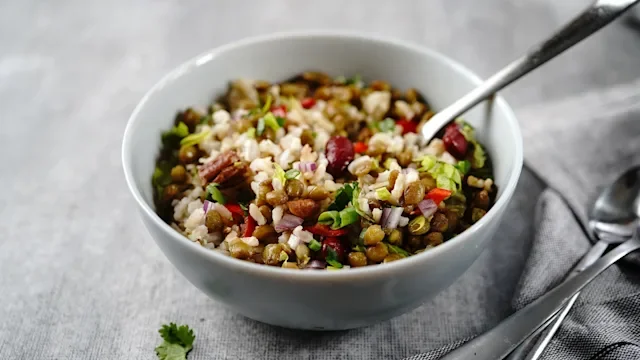Key takeaways:
To choose the best oil for cooking, you should consider the nutritional value, smoke point, and flavor profile of the oil.
The best oils for cooking with middle to high heat include refined avocado oil, olive oil, and canola oil.
Walnut oil, flaxseed oil, and infused oils contain delicate chemical structures that are sensitive to heat. They’re better used in salad dressings or drizzled over food after heating.
Throughout the last few decades, the cooking oil options in the grocery aisles have significantly increased. Should you buy cold pressed? Refined? Infused? And should your choice be different depending on how you’re cooking? If you find yourself overwhelmed by the options, you’re not alone. In this article, we share a guide to help you choose the best cooking oil for your needs.
How should I choose the right oil for cooking?
Cooking can mean a lot of different things. Are you baking at 350°F? Are you grilling? Or are you making a stir-fry? Cooking oils are used to transfer heat to the food. Along the way, your food also picks up some of the oil, which also adds flavor and nutrition. There are a number of factors to consider when you’re choosing the best oil for cooking.
Nutritional value
All cooking oils are fats that are liquid at room temperature. But not all fats are created equal. To choose the healthiest oil, consider how much it contains of:
Monounsaturated fats (MUFAs): Monounsaturated fats from plant sources are linked to better heart health and even living longer. Safflower, olive, canola, and avocado oils are especially high in monounsaturated fats.
Polyunsaturated fats (PUFAs): Polyunsaturated fats are important for brain health and heart health. They can also increase your levels of high-density lipoprotein (HDL) cholesterol, or “good” cholesterol. Soybean, walnut, flaxseed, and corn oils have the highest levels of polyunsaturated fats.
Omega-3 fatty acids: These are a type of polyunsaturated fat that your body can’t make, so you have to get it from your diet. Omega-3 fatty acids help with maintaining the health of your body’s vision, immune health, reproduction, and more. Soybean, walnut, flaxseed and corn oil are excellent sources of polyunsaturated fats.
Saturated fat: While there’s some controversy about whether saturated fat is bad for heart health, the Dietary Guidelines for Americans recommend limiting saturated fat to no more than 10% of your daily calories. Palm oil and coconut oil are especially high in saturated fat.
Type of cooking
Your choice of cooking oil might depend on whether you’re going to be cooking with low heat or high heat. This is because oils will start to emit air pollutants when they get too hot. These air pollutants may increase the risk of health problems like lung disease or cancer. The temperature when this happens is called the smoke point. And it’s different for each oil. More on this below.
Processing
Refining means that the oils are extracted from their natural sources using heat or chemicals. Refined oils have a longer shelf life, and can withstand higher temperatures. Some oils — like soybean or sunflower — must be refined to remove contaminants like pesticides or trace metals. Other oils — like avocado or olive oil — can come in refined or unrefined forms. If an oil is labeled “extra virgin” or “cold-pressed”, it’s unrefined.
The refining process can remove some of the valuable nutrients in oils. So unrefined oils are generally considered more nutritious. But the refining process can also make oils safer to use at higher temperatures. So if you’re cooking food on high heat, regular olive oil is a better choice than extra virgin olive oil.
Flavor
Your choice of cooking oil might depend on whether you’re looking to add flavor to your food, or not. Some oils — like walnut or flaxseed oil — can change the taste of your food. Other oils — like canola oil and grapeseed oil — are more neutral in flavor, so they won’t affect the taste.
There are also many oils on grocery shelves that have added or infused flavors — like garlic, truffle, rosemary, or parmesan. Many of these flavor compounds may be destroyed at higher temperatures. It’s best to use these oils for salad dressings or as a drizzle after the food is done cooking.

What is a smoke point?
Smoke point is the temperature where an oil starts to smoke continuously, and emit blue hazy smoke. Seeing smoke while using cooking oil means the heat is causing the fat to break down into glycerol (an alcohol) and free fatty acids. Cooking beyond that can cause the release of harmful indoor air pollutants.
Read more like this
Explore these related articles, suggested for readers like you.
As noted above, these particles are considered carcinogens (potential cancer-causing substances). So if you’re cooking food at medium-to-high heat, consider using an oil with a higher smoke point.
Use this chart to determine the type of oil for the type of cooking you plan to do. Consider selecting an oil with a high smoke point to keep in your pantry that you can use for most cooking.
Type of oil | Smoke point (°F) |
Avocado oil, refined | 520 |
Canola oil, refined | 400 |
Coconut oil | 350 |
Extra virgin olive oil | 410 |
Flaxseed oil | 225, refined |
Palm oil | 450 |
Peanut oil, unrefined | 450 |
Regular olive oil | 468 |
Safflower oil | 510 |
Soybean oil | 450 |
Walnut oil, unrefined | 320 |
Cooking method | Cooking temperature (°F) |
Dressing or drizzling | Room temperature |
Baking | 300-375 |
Sauteing | 250-350 |
Frying | 375 |
Grilling | 400-500 |
Roasting | 425 |
What are the best oils for cooking?
When choosing an oil for cooking, the best options are the ones that:
Are high in polyunsaturated and monounsaturated fats
Have a relatively high smoke point
1. Avocado oil
Avocado oil tops the list when it comes to health benefits and smoke point. Avocado (and avocado oil) consumption in the United States has increased six times since the 1980s. This is partly because of their taste, and also because avocado is packed with nutrients.
Avocado oil is high in oleic acid, which has been associated with lowering low-density lipoprotein (LDL) cholesterol and increasing HDL cholesterol levels. Refined avocado oil also has one of the highest smoke points of up to 520°F. So you can use it for any kind of cooking, including frying. But keep in mind that some of the nutritional benefits of avocado oil — like the antioxidant chlorophyll — may be degraded at high heat.
2. Olive oil
This is another great, heart-healthy option. Although it can’t stand up to high heat as well as avocado oil.
Vicki Shanta Retelny, RDN, a registered dietitian nutritionist and author of Total Body Diet For Dummies, recommends extra virgin olive oil for low-to-medium cooking temperatures.
“It imparts great flavor, beneficial monounsaturated fats, antioxidants, and phenolic compounds,” she said. “These compounds have been shown to protect cells from damage and decrease risks for chronic diseases.”
The health benefits of extra virgin olive oil are maintained when used for sauteing, but shouldn’t be used for deep frying or grilling. Regular olive oil — instead of extra virgin — is a good choice if you’re cooking at higher temperatures. Olive oil and extra virgin olive oil both tend to be more expensive because they’re imported from Europe.
3. Canola oil
Canola oil is a mild-tasting oil that won’t change the flavor of what you’re cooking. It’s also an affordable option, costing less than avocado or olive oil.
The majority of canola oil is produced in Canada, and comes from the seeds of the rapeseed plant. You may spot the American Heart Association Heart Check on a bottle of canola oil because of its documented benefits on cardiovascular health.
Using canola oil when cooking is associated with reducing total cholesterol and LDL cholesterol in adults older than 50 years of age. Even though it doesn’t have the highest smoke point of cooking oils, it’s still high enough that you can use it for frying foods.
What are the worst oils for cooking?
Some oils that are higher in monounsaturated and polyunsaturated fats are also more sensitive to higher heat. Because of their delicate chemical structures, the chemical bonds break easier. This process can pose some health risks. Nut and seed oils, specifically, should not be heated.
Flaxseed oil and walnut oil
Culinary experts don’t recommend cooking with oils like walnut or flaxseed oil because of their low smoke point.
Both flaxseed and walnut oil contain omega-3 fatty acids, which are a type of polyunsaturated fat that has a more unbalanced chemical structure. The compound found in flaxseeds and walnuts called alpha-linolenic acid has antioxidant properties, which is what links it to its anti- inflammatory properties and heart health benefits.
But these benefits can be lost at higher temperatures. Retelny doesn’t recommend heating these oils because heat changes the composition of the oil, creating potentially inflammatory, cancer-causing compounds.
Flavored oils
Infused oils are oils that have different flavors added to them — like truffle oil or garlic oil. They have become popular in regular grocery stores and specialty food stores. They may be good for a salad dressing or for drizzling on toasted bread. It’s not recommended to cook flavored oils at high heat as the temperatures can destroy the flavor.
Is coconut oil good or bad for you?
Coconut oil is surrounded by some controversy.
Coconut oil is different from other plant oils because it has a higher amount of saturated fat. This is why it’s solid at cooler room temperatures. And high amounts of saturated fat can be risky for heart health. Systematic reviews indicate that coconut oil consumption raises both LDL cholesterol (“bad” cholesterol) and total cholesterol levels.
But that’s not the whole story. Coconut oil can also increase your HDL, or good cholesterol, level. Some argue that the type of fat in coconut may be absorbed differently and may help with brain health or lead to other benefits. It also contains antioxidants that could have health benefits.
To date, there haven’t been any randomized controlled trials (the gold standard of research) that have looked at cardiovascular outcomes and coconut oil consumption. Overall, researchers believe that coconut doesn’t have enough evidence to back it as a “healthy” oil. If you keep it in your pantry, try to use it sparingly.
The bottom line
Cooking oils add flavor, nutrients, and transfer heat during cooking. Selecting the right cooking oil is important for the taste of your recipe, as well as the safety of your cooking. Canola oil, olive oil, and refined avocado oil are great options to keep in your pantry for most types of cooking. If you’re looking to add a different flavor or add omega-3 fatty acids, consider using walnut oil or flaxseed oil for salad dressings or as a drizzle after your recipe is done.

Why trust our experts?



References
Astrup, A., et al. (2021). Dietary saturated fats and health: Are the U.S. guidelines evidence-based? Nutrients.
Bentsen, H. (2017). Dietary polyunsaturated fatty acids, brain function and mental health. Microbial Ecology in Health and Disease.
Chen, H-C., et al. (2018). Exposure to cooking oil fumes and chronic bronchitis in nonsmoking women aged 40 years and over: A health-care based study. BMC Public Health.
Chen, T., et al. (2020). Impact of cooking oil fume exposure and fume extractor use on lung cancer risk in non-smoking Han Chinese women. Scientific Reports.
Córdoba, R. P., et al. (2023). Bioactive compounds in Spanish extra virgin olive oils: Migration and stability according to the culinary technique used. Food Research International.
Crosby, G. (2018). Do cooking oils present a health risk? Food Technology.
Fullana, A., et al. (2010). Emissions of volatile aldehydes from heated cooking oils. Food Chemistry.
Gharby, S. (2022). Refining vegetable oils: Chemical and physical refining. The Scientific World Journal.
Ghobadi, S., et al. (2018). Effects of canola oil consumption on lipid profile: A systematic review and meta-analysis of randomized controlled clinical trials. Journal of the American College of Nutrition.
Guasch-Ferré, M., et al. (2019). Associations of monounsaturated fatty acids from plant and animal sources with total and cause-specific mortality in two US prospective cohort studies. Circulation Research.
Hashempour-Baltork, F., et al. (2022). Nutritional aspects of vegetable oils: Refined or unrefined? European Journal of Lipid Science and Technology.
Hewlings, S. (2020). Coconuts and health: Different chain lengths of saturated fats require different consideration. Journal of Cardiovascular Development and Disease.
MyPlate. (n.d.). About oils. U.S. Department of Agriculture.
Office of Dietary Supplements. (2022). Omega-3 fatty acids: Fact sheet for consumers. National Institutes of Health.
Resende, L. M. B., et al. (2018). Changes in quality and phytochemical contents of avocado oil under different temperatures. Journal of Food Science and Technology.
Sacks, F. M. (2020). Coconut oil and heart health: Fact or fiction? Circulation.
ScienceDirect. (n.d.). Canola oil.
ScienceDirect. (n.d.). Walnut oil.
Sekhar, S., et al. (2022). Are we nuts over coconuts? Studying the effects of coconut oil on low-density lipoprotein and cardiovascular diseases: A systematic review. Cureus.
Shahbandeh, M. (2023). U.S. annual avocado consumption 1985-2022. Statista.
Sokoła-Wysoczańska, E., et al. (2018). Polyunsaturated fatty acids and their potential therapeutic role in cardiovascular system disorders—A review. Nutrients.
U.S. Soy. (n.d.). You should continue adding seed oil into your diet. Here’s why: 5 fascinating facts about seed oils.
U.S. Dietary Administration. (2020). Dietary guidelines for Americans, 2020-2025.
Zhai, S. R., et al. (2020). Airborne particles from cooking oils: Emission test and analysis on chemical and health implications. Sustainable Cities and Society.


















